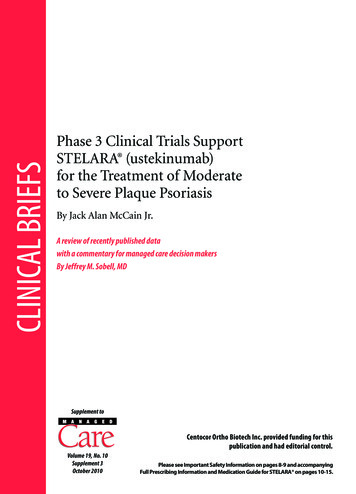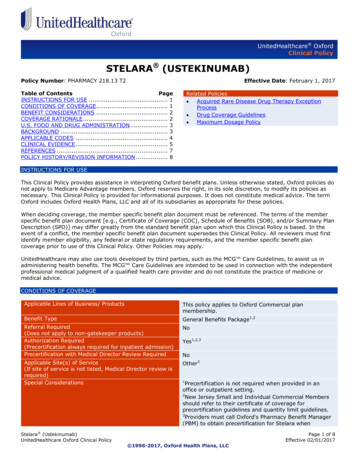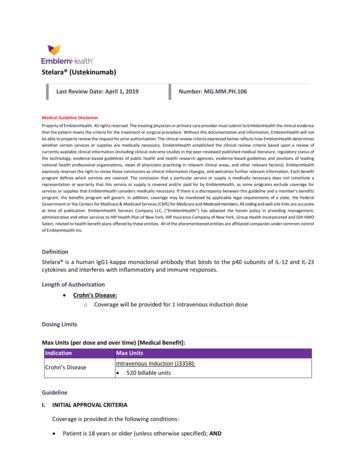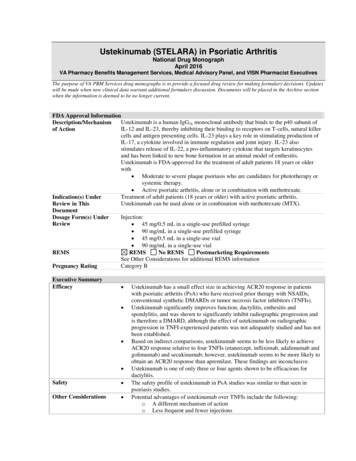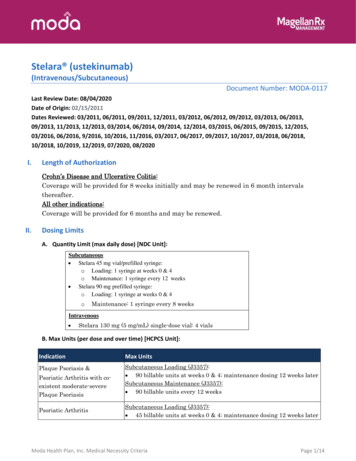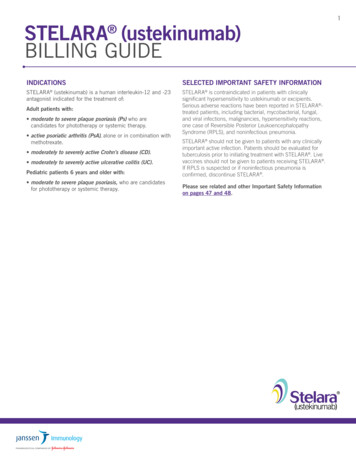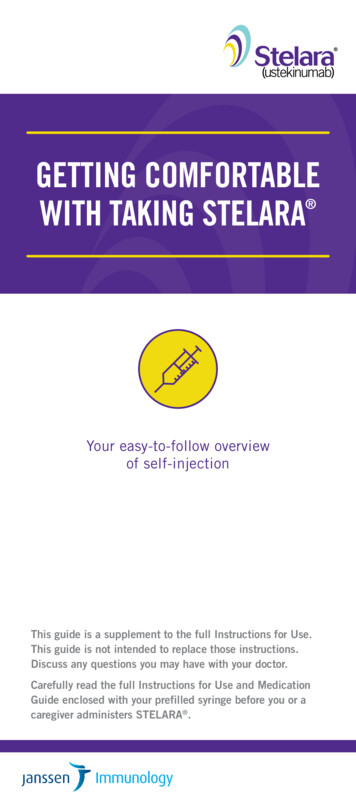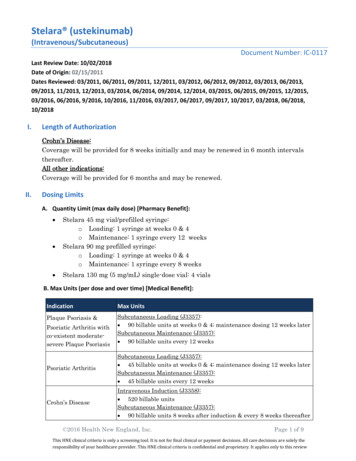
Transcription
Stelara (ustekinumab)(Intravenous/Subcutaneous)Document Number: IC-0117Last Review Date: 10/02/2018Date of Origin: 02/15/2011Dates Reviewed: 03/2011, 06/2011, 09/2011, 12/2011, 03/2012, 06/2012, 09/2012, 03/2013, 06/2013,09/2013, 11/2013, 12/2013, 03/2014, 06/2014, 09/2014, 12/2014, 03/2015, 06/2015, 09/2015, 12/2015,03/2016, 06/2016, 9/2016, 10/2016, 11/2016, 03/2017, 06/2017, 09/2017, 10/2017, 03/2018, 06/2018,10/2018I.Length of AuthorizationCrohn’s Disease:Coverage will be provided for 8 weeks initially and may be renewed in 6 month intervalsthereafter.All other indications:Coverage will be provided for 6 months and may be renewed.II.Dosing LimitsA. Quantity Limit (max daily dose) [Pharmacy Benefit]: Stelara 45 mg vial/prefilled syringe:o Loading: 1 syringe at weeks 0 & 4o Maintenance: 1 syringe every 12 weeksStelara 90 mg prefilled syringe:o Loading: 1 syringe at weeks 0 & 4o Maintenance: 1 syringe every 8 weeksStelara 130 mg (5 mg/mL) single-dose vial: 4 vialsB. Max Units (per dose and over time) [Medical Benefit]:IndicationMax UnitsPlaque Psoriasis &Subcutaneous Loading (J3357): 90 billable units at weeks 0 & 4; maintenance dosing 12 weeks laterSubcutaneous Maintenance (J3357): 90 billable units every 12 weeksPsoriatic Arthritis withco-existent moderatesevere Plaque PsoriasisPsoriatic ArthritisSubcutaneous Loading (J3357): 45 billable units at weeks 0 & 4; maintenance dosing 12 weeks laterSubcutaneous Maintenance (J3357): 45 billable units every 12 weeksCrohn’s DiseaseIntravenous Induction (J3358): 520 billable unitsSubcutaneous Maintenance (J3357): 90 billable units 8 weeks after induction & every 8 weeks thereafter 2016 Health New England, Inc.Page 1 of 9This HNE clinical criteria is only a screening tool. It is not for final clinical or payment decisions. All care decisions are solely theresponsibility of your healthcare provider. This HNE clinical criteria is confidential and proprietary. It applies only to this review
III.Initial Approval CriteriaCoverage is provided in the following conditions: Patient is 18 years or older (unless otherwise specified); ANDPatient has been evaluated and screened for the presence of latent TB infection prior toinitiating treatment; ANDPatient is free of any clinically important active infections; ANDTherapy will not be administered concurrently with live vaccines; ANDPatient is not on concurrent treatment with a TNF-inhibitor, biologic response modifier or othernon-biologic agent (i.e., apremilast, tofacitinib, baricitinib); ANDPhysician has assessed baseline disease severity utilizing an objective measure/tool; ANDPlaque Psoriasis † Patient is 12 years or older; AND Patient has moderate to severe plaque psoriasis for at least 6 months with at least one of thefollowing:oooInvolvement of at least 10% of body surface area (BSA); ORPsoriasis Area and Severity Index (PASI) score of 10 or greater; ORIncapacitation due to plaque location (i.e. head and neck, palms, soles or genitalia); AND Patient did not respond adequately (or is not a candidate) to a 3 month minimum trial oftopical agents (i.e., anthralin, coal tar preparations, corticosteroids, emollients,immunosuppressives, keratolytics, retinoic acid derivatives, and/or vitamin D analogues);AND Patient did not respond adequately (or is not a candidate) to a 3 month minimum trial of atleast one systemic agent (i.e., immunosuppressives, retinoic acid derivatives, and/ormethotrexate); AND Patient did not respond adequately (or is not a candidate) to a 3 month minimum trial ofphototherapy (i.e., psoralens with UVA light (PUVA) or UVB with coal tar or dithranol)Psoriatic Arthritis (PsA) † Documented moderate to severe active disease; ANDoFor patients with predominantly axial disease OR active enthesitis and/or dactylitis, anadequate trial and failure of at least TWO (2) non-steroidal anti-inflammatory agents(NSAIDs), unless use is contraindicated; ORoFor patients with peripheral arthritis, a trial and failure of at least a 3 month trial ofONE oral disease-modifying anti-rheumatic agent (DMARD) such as methotrexate,azathioprine, sulfasalazine, or hydroxychloroquineCrohn’s Disease † Documented moderate to severely active disease; AND 2016 Health New England, Inc.Page 2 of 9This HNE clinical criteria is only a screening tool. It is not for final clinical or payment decisions. All care decisions are solely theresponsibility of your healthcare provider. This HNE clinical criteria is confidential and proprietary. It applies only to this review
Documented failure, contraindication, or ineffective response at maximum tolerated doses toa minimum (3) month trial of corticosteroids or immunomodulators (e.g. azathioprine, 6mercaptopurine, or methotrexate); AND Documented failure, contraindication, or ineffective response at maximum tolerated doses toa minimum (3) month trial of a TNF modifier (e.g. adalimumab, certolizumab, or infliximab)† FDA Approved Indication(s)IV.Renewal CriteriaCoverage can be renewed based upon the following criteria: Patient continues to meet the criteria identified in section III; ANDAbsence of unacceptable toxicity from the drug. Examples of unacceptable toxicity includethe following: serious infections, malignancy, severe hypersensitivity reactions, reversibleposterior leukoencephalopathy syndrome (RPLS), non-infectious pneumonia, etc; ANDPatient is receiving ongoing monitoring for presence of TB or other active infections; ANDPlaque Psoriasis Disease response as indicated by improvement in signs and symptoms compared to baselinesuch as redness, thickness, scaliness, and/or the amount of surface area involvement (a totalBSA involvement 1%), and/or an improvement on a disease activity scoring tool [e.g. a 75%reduction in the PASI score from when treatment started (PASI 75) or a 50% reduction inthe PASI score (PASI 50) and a four-point reduction in the DLQI from when treatmentstarted.Psoriatic Arthritis (PsA) Disease response as indicated by improvement in signs and symptoms compared to baselinesuch as the number of tender and swollen joint counts and/or an improvement on a diseaseactivity scoring tool [e.g. defined as an improvement in at least 2 of the 4 Psoriatic ArthritisResponse Criteria (PsARC), 1 of which must be joint tenderness or swelling score, with noworsening in any of the 4 criteria.]Crohn’s Disease Disease response as indicated by improvement in signs and symptoms compared to baselinesuch as endoscopic activity, number of liquid stools, presence and severity of abdominalpain, presence of abdominal mass, body weight compared to IBW, hematocrit, presence ofextra intestinal complications, use of anti-diarrheal drugs, tapering or discontinuation ofcorticosteroid therapy, and/or an improvement on a disease activity scoring tool [e.g. animprovement on the Crohn’s Disease Activity Index (CDAI) score or the Harvey-BradshawIndex score.] 2016 Health New England, Inc.Page 3 of 9This HNE clinical criteria is only a screening tool. It is not for final clinical or payment decisions. All care decisions are solely theresponsibility of your healthcare provider. This HNE clinical criteria is confidential and proprietary. It applies only to this review
V.Dosage/AdministrationIndicationDoseAdult Subcutaneous Loading Dose: 100 kg: 45 mg at weeks 0 & 4, then begin maintenance dosing 12 weeks later 100 kg: 90 mg at weeks 0 & 4, then begin maintenance dosing 12 weeks laterAdult Subcutaneous Maintenance Dose:Plaque Psoriasis 100 kg: 45 mg every 12 weeks 100 kg: 90 mg every 12 weeks&PsoriaticArthritis withco-existentmoderate-severePlaque PsoriasisPediatric Subcutaneous Loading Dose: 60 kg: 0.75 mg/kg at weeks 0 & 4, then begin maintenance dosing 12 weeks later 60 – 100 kg: 45 mg at weeks 0 & 4, then begin maintenance dosing 12 weeks later 100 kg: 90 mg at weeks 0 & 4, then begin maintenance dosing 12 weeks laterPediatric Subcutaneous Maintenance Dose: 60 kg: 0.75 mg/kg every 12 weeks 60 – 100 kg: 45 mg every 12 weeks 100 kg: 90 mg every 12 weeksSubcutaneous Loading Dose: 45 mg at weeks 0 & 4, then begin maintenance dosing 12 weeks laterSubcutaneous Maintenance Dose: 45 mg every 12 weeksIntravenous Induction Dose (one-time only): 55 kg: 260 mg 55 kg to 85 kg: 390 mgCrohn’s Disease 85 kg: 520 mgSubcutaneous Maintenance Dose: 90 mg given 8 weeks after the initial IV dose, then every 8 weeks thereafterPsoriaticArthritisVI.Billing Code/Availability InformationJcode: J3357 – Ustekinumab, for subcutaneous injection, 1 mg; 1 billable unit 1 mg J3358 – Ustekinumab, for intravenous injection, 1 mg; 1 billable unit 1 mgNDC: Stelara 45 mg vial and prefilled syringe: 57894-0060-xx Stelara 90 mg prefilled syringe: 57894-0061-xx Stelara 130 mg (5 mg/mL) single-dose vial: 57894-0054-xxVII.References1. Stelara [package insert]. Horsham, PA; Janssen Biotech, Inc; June 2018. Accessed September2018.2. Leonardi CL, Kimball AB, Papp KA, et al, “Efficacy and Safety of Ustekinumab, a HumanInterleukin-12/23 Monoclonal Antibody, in Patients With Psoriasis: 76-Week Results from a 2016 Health New England, Inc.Page 4 of 9This HNE clinical criteria is only a screening tool. It is not for final clinical or payment decisions. All care decisions are solely theresponsibility of your healthcare provider. This HNE clinical criteria is confidential and proprietary. It applies only to this review
Randomised, Double-Blind, Placebo-Controlled Trial (PHOENIX 1),” Lancet, 2008, 371(9625):1665-74.3. Papp KA, Langley RG, Lebwohl M, et al, “Efficacy and Safety of Ustekinumab, a HumanInterleukin-12/23 Monoclonal Antibody, in Patients With Psoriasis: 52-Week Results from aRandomised, Double-Blind, Placebo-Controlled Trial (PHOENIX 2),” Lancet, 2008, 371(9625):1675-84.4. Hsu S, Papp KA, Lebwohl MG, et al. Consensus guidelines for the management of plaquepsoriasis. Arch Dermatol. 2012 Jan;148(1):95-102.5. Papp KA, Griffiths CE, Gordon K, et al. Long-term safety of ustekinumab in patients withmoderate-to-severe psoriasis: final results from 5 years of follow-up. Br J Dermatol. 2013Apr;168(4):844-54.6. Menter A, Gottlieb A, Feldman SR, et al. Guidelines of care for the management of psoriasisand psoriatic arthritis: Section 1. Overview of psoriasis and guidelines of care for thetreatment of psoriasis with biologics. J Am Acad Dermatol. 2008 May;58(5):826-50. doi:10.1016/j.jaad.2008.02.039.7. Gottlieb A, Korman NJ, Gordon KB, Feldman SR, Lebwohl M, Koo JY, Van Voorhees AS,Elmets CA, Leonardi CL, Beutner KR, Bhushan R, Menter A. Guidelines of care for themanagement of psoriasis and psoriatic arthritis: Section 2. Psoriatic arthritis: overview andguidelines of care for treatment with an emphasis on the biologics. J Am Acad Dermatol 2008May;58(5):851-64.8. Gossec L, Smolen JS, Ramiro S, et al. European League Against Rheumatism (EULAR)recommendations for the management of psoriatic arthritis with pharmacological therapies:2015 update. Ann Rheum Dis. 2015 Dec 7. pii: annrheumdis-2015-208337. doi:10.1136/annrheumdis-2015-208337.9. Lichtenstein GR, Hanauer SB, Sandborn WJ, Practice Parameters Committee of AmericanCollege of Gastroenterology. Management of Crohn’s disease in adults. Am J Gastroenterol.2009;104(2):465.10. Terdiman JP, Gruss CB, Heidelbaugh JJ, et al. American Gastroenterological AssociationInstitute guideline on the use of thiopurines, methotrexate, and anti-TNF-α biologic drugs forthe induction and maintenance of remission in inflammatory Crohn's disease.Gastroenterology. 2013 Dec;145(6):1459-63. doi: 10.1053/j.gastro.2013.10.047.11. Gomollón F, Dignass A, Annese V, et al. EUROPEAN Evidence-based consensus on thediagnosis and management of Crohn's disease 2016: Part 1: Diagnosis and medicalmanagement. J Crohns Colitis. 2016 Sep 22. pii: jjw168.12. Harbord M, Eliakim R, Bettenworth D, et al. Third European Evidence-based Consensus onDiagnosis and Management of Ulcerative Colitis. Part 2: Current Management. J CrohnsColitis. 2017 Jan 28. doi: 10.1093/ecco-jcc/jjx009.13. National Institute for Health and Care Excellence. NICE 2012. Crohn’s Disease:Management. Published 10 October 2012. Clinical Guideline . 2016 Health New England, Inc.Page 5 of 9This HNE clinical criteria is only a screening tool. It is not for final clinical or payment decisions. All care decisions are solely theresponsibility of your healthcare provider. This HNE clinical criteria is confidential and proprietary. It applies only to this review
14. National Institute for Health and Care Excellence. NICE 2017. Certolizumab pegol andsecukinumab for treating active psoriatic arthritis after inadequate response to DMARDs.Published 24 May 2017. Technology Appraisal Guidance pter/1-Recommendations. Accessed August 2017.15. National Institute for Health and Care Excellence. NICE 2008. Infliximab for the treatmentof adults with psoriasis. Published 23 January 2008. Technology Appraisal Guidance[TA134]. s-pdf-82598193811141.16. Smith CH, Jabbar-Lopez ZK, Yiu ZK, et al. British Association of Dermatologists guidelinesfor biologic therapy for psoriasis 2017. Br J Dermatol. 2017 Sep;177(3):628-636. doi:10.1111/bjd.15665.17. Lichtenstein GR, Loftus EV, Isaacs KI, et al. ACG Clinical Guideline: Management ofCrohn’s Disease in Adults. Am J Gastroenterol 2018; 113:481–517; doi: 10.1038/ajg.2018.2718. Noridian Healthcare Solutions, LLC. Local Coverage Articles (LCA): ChemotherapyAdministration (A52991). Centers for Medicare & Medicaid Services, Inc. Updated on3/15/2018 with effective date 04/01/2018. Accessed September 2018.19. Noridian Healthcare Solutions, LLC. Local Coverage Articles (LCA): ChemotherapyAdministration (A52953). Centers for Medicare & Medicaid Services, Inc. Updated on03/15/2018 with effective date 04/01/2018. Accessed September 2018.Appendix 1 – Covered Diagnosis CodesSubcutaneous (J3357)ICD-10ICD-10 DescriptionK50.00Crohn’s disease of small intestine without complicationsK50.011Crohn’s disease of small intestine with rectal bleedingK50.012Crohn’s disease of small intestine with intestinal obstructionK50.013Crohn’s disease of small intestine with fistulaK50.014Crohn’s disease of small intestine with abscessK50.018Crohn’s disease of small intestine with other complicationK50.019Crohn’s disease of small intestine with unspecified complicationsK50.10Crohn’s disease of large intestine without complicationsK50.111Crohn’s disease of large intestine with rectal bleedingK50.112Crohn’s disease of large intestine with intestinal obstructionK50.113Crohn’s disease of large intestine with fistulaK50.114Crohn’s disease of large intestine with abscessK50.118Crohn’s disease of large intestine with other complicationK50.119Crohn’s disease of large intestine with unspecified complicationsK50.80Crohn’s disease of both small and large intestine without complications 2016 Health New England, Inc.Page 6 of 9This HNE clinical criteria is only a screening tool. It is not for final clinical or payment decisions. All care decisions are solely theresponsibility of your healthcare provider. This HNE clinical criteria is confidential and proprietary. It applies only to this review
ICD-10ICD-10 DescriptionK50.811Crohn’s disease of both small and large intestine with rectal bleedingK50.812Crohn’s disease of both small and large intestine with intestinal obstructionK50.813Crohn’s disease of both small and large intestine with fistulaK50.814Crohn’s disease of both small and large intestine with abscessK50.818Crohn’s disease of both small and large intestine with other complicationK50.819Crohn’s disease of both small and large intestine with unspecified complicationsK50.90Crohn’s disease, unspecified, without complicationsK50.911Crohn’s disease, unspecified, with rectal bleedingK50.912Crohn’s disease, unspecified, with intestinal obstructionK50.913Crohn’s disease, unspecified, with fistulaK50.914Crohn’s disease, unspecified, with abscessK50.918Crohn’s disease, unspecified, with other complicationK50.919Crohn’s disease, unspecified, with unspecified complicationsL40.0Psoriasis vulgarisL40.50Arthropathic psoriasis, unspecifiedL40.51Distal interphalangeal psoriatic arthropathyL40.52Psoriatic arthritis mutilansL40.53Psoriatic spondylitisL40.59Other psoriatic arthropathyIntravenous (J3358)ICD-10ICD-10 DescriptionK50.00Crohn’s disease of small intestine without complicationsK50.011Crohn’s disease of small intestine with rectal bleedingK50.012Crohn’s disease of small intestine with intestinal obstructionK50.013Crohn’s disease of small intestine with fistulaK50.014Crohn’s disease of small intestine with abscessK50.018Crohn’s disease of small intestine with other complicationK50.019Crohn’s disease of small intestine with unspecified complicationsK50.10Crohn’s disease of large intestine without complicationsK50.111Crohn’s disease of large intestine with rectal bleedingK50.112Crohn’s disease of large intestine with intestinal obstructionK50.113Crohn’s disease of large intestine with fistulaK50.114Crohn’s disease of large intestine with abscess 2016 Health New England, Inc.Page 7 of 9This HNE clinical criteria is only a screening tool. It is not for final clinical or payment decisions. All care decisions are solely theresponsibility of your healthcare provider. This HNE clinical criteria is confidential and proprietary. It applies only to this review
ICD-10ICD-10 DescriptionK50.118Crohn’s disease of large intestine with other complicationK50.119Crohn’s disease of large intestine with unspecified complicationsK50.80Crohn’s disease of both small and large intestine without complicationsK50.811Crohn’s disease of both small and large intestine with rectal bleedingK50.812Crohn’s disease of both small and large intestine with intestinal obstructionK50.813Crohn’s disease of both small and large intestine with fistulaK50.814Crohn’s disease of both small and large intestine with abscessK50.818Crohn’s disease of both small and large intestine with other complicationK50.819Crohn’s disease of both small and large intestine with unspecified complicationsK50.90Crohn’s disease, unspecified, without complicationsK50.911Crohn’s disease, unspecified, with rectal bleedingK50.912Crohn’s disease, unspecified, with intestinal obstructionK50.913Crohn’s disease, unspecified, with fistulaK50.914Crohn’s disease, unspecified, with abscessK50.918Crohn’s disease, unspecified, with other complicationK50.919Crohn’s disease, unspecified, with unspecified complicationsAppendix 2 – Centers for Medicare and Medicaid Services (CMS)Medicare coverage for outpatient (Part B) drugs is outlined in the Medicare Benefit Policy Manual(Pub. 100-2), Chapter 15, §50 Drugs and Biologicals. In addition, National Coverage Determination(NCD) and Local Coverage Determinations (LCDs) may exist and compliance with these policies isrequired where applicable. They can be found at: h/advanced-search.aspx. Additional indications may be covered at the discretion ofthe health plan.Medicare Part B Covered Diagnosis Codes (applicable to existing NCD/LCD):J3358Jurisdiction(s): ENCD/LCD Document (s): se/search/article-datesearch.aspx?DocID A52953&bc gAAAAAAAAAAAJurisdiction(s): FNCD/LCD Document (s): se/search/article-datesearch.aspx?DocID A52991&bc gAAAAAAAAAAA 2016 Health New England, Inc.Page 8 of 9This HNE clinical criteria is only a screening tool. It is not for final clinical or payment decisions. All care decisions are solely theresponsibility of your healthcare provider. This HNE clinical criteria is confidential and proprietary. It applies only to this review
Medicare Part B Administrative Contractor (MAC) Jurisdi
Stelara 45 mg vial and prefilled syringe: 57894-0060-xx Stelara 90 mg prefilled syringe: 57894-0061-xx Stelara 130 mg (5 mg/mL) single-dose vial: 57894-0054-xx VII. References 1. Stelara [package insert]. Horsham, PA; Jan
